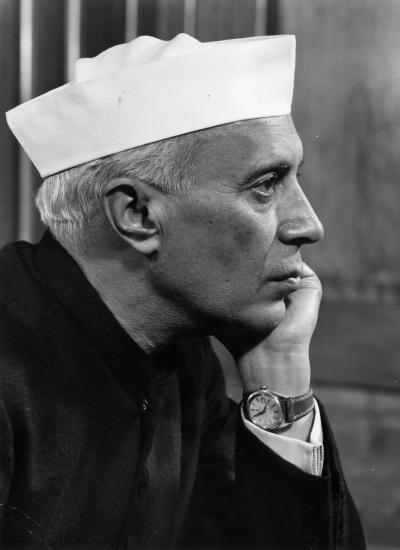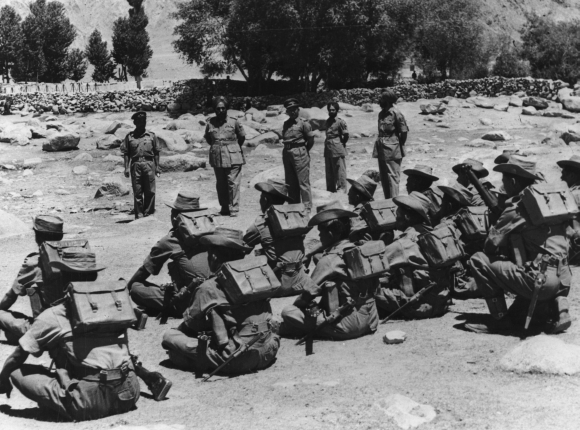Photographs: Baron/Getty Images
Colonel (retd) Anil Athale take a critical look at Jawaharlal Nehru's foreign and defence policy contributions and failures.
On May 27 we enter the 50th year of Jawaharlal Nehru's passing away. Even after half a century, he remains a beacon and a titan who shaped India of today. As a post 1947 generation Indian, one was very familiar with the image of 'chacha' (uncle) Nehru and his death was a personal loss to many like me.
It will not be an exaggeration to say that there was scarcely a dry eye on that day! He loved India and Indians in turn loved him. There is also absolutely no doubt that credit for much of Indian progress in myriad fields from a robust democracy to our progress in science and technology owes a huge debt to him.
But this is not a eulogy to that great son of India but an attempt at having a critical look at his foreign and defence policy contributions and failures. The role of a historian is like an umpire, but it does not mean that an umpire who oversaw a Don Bradman is superior to that cricketing legend, and one is conscious of this fact while carrying out historical analysis.
Much of contemporary criticism of Nehru is coloured by doings of the current 'rulers' who continue to evoke his name for all their doings. Critics also fail to see his actions in context. But above all Nehru is a victim of his own image as an idealist and dreamer. What follows is a re-look at his defence and foreign policy. This author is not competent to deal with the other aspect of his era.
The origin of these myths is based on his actions in Kashmir in 1947/48. It must be understood that but for his influencing the boundary commission under Cyril Radcliffe to get Gudaspur and Pathankot tehsil into India, Kashmir would have been annexed by Pakistan since India would not have had a convenient land access.
Even in Muslim majority Srinagar valley, he won over Sheikh Abdullah and got Jammu and Kashmir to merge with India. His Kashmiri origin played a major role in this. But for his interest/influence, the Indo-Pak border could well have been on the Pir Panjal mountains.in this. But for his interest/influence, the Indo-Pak border could well have been on the Pir Panjal mountains.
...
If Kashmiris are spared US drone attacks, credit goes to Nehru
Image: A veiled Kashmiri Muslim woman shouts slogans during a protest rally in SrinagarPhotographs: Danish Ismail/Reuters
There is much criticism of his decision to order Brigadier L P Sen to turn away from Muzaffarabad in December 1947, when it seems that it was well in our grasp. Here Nehru, influenced by Sheikh Abdullah realised that the current area of PoK (Pakistan-occupied Kashmir) has far greater affinity to Punjab than Kashmir.
Getting a large chunk of anti-Indian population into India was not in our long-term interest. It is another matter that the pull of religion has proved too strong for even the Kashmir valley. But all said and done, if Kashmiris are spared the American drone attacks and daily mayhem that is happening in Pakistan, it goes to the credit of Nehru who brought about the merger of Kashmir with India.
Writing about the 1962 India China war, the biggest black mark on Nehru's copy book, this author after a study of the Henderson Brooks report and the Kennedy archives, came to the conclusion that Nehru was not unaware of Chinese designs. Where he went wrong was that he could not foresee the Cuban Missile crisis that distracted the US and gave China the opportunity to humiliate India.
Some time back the son of diplomat G Parathasarthy had clarified in the media that Nehru had warned his father not to trust the Chinese when the former was appointed ambassador to China. 1962 was a 'miscalculation' on part of Nehru and not due to naivete. His calculation was that given tacit American support and friendship with Soviet Union, China will not dare to attack India. His constant theme in the years 1960 to 1962 was there will be no war.
A glimpse into his 'realism' was his statement in Chicago in 1949. During his first visit to the US, he had reached Chicago after a tiring journey, but readily gave a radio interview. When the interviewer asked as to why a desperately poor country like India and pacifist like him spent resources on the armed forces, Nehru replied that no individual had a right to jeopardise a nation's security for individual convictions. Then how does one explain his 'neglect' of defence forces?
The answer must be found in the situation/context of those times. Nehru firmly believed that India only faced a 'real' threat from Pakistan. Given India's superiority in numbers and our geopolitical advantage (remember East and West Pakistan were separated by 1,000 miles of India then), he felt no need to spend more than barely necessary on defence. His view of the Chinese threat is already mentioned above.
...
Nehru laid the foundation of nuclear powered India
Image: Nehru with Dr Homi BhabhaPhotographs: Courtesy: nuclearweaponarchive.org
On the other hand he did look into the future and believed that the industrialisation that he had begun will in time automatically create wherewithal for defence of the country. His suspicion of the military, howsoever ill founded, was based on the fact that in most newly independent countries, military takeovers was the norm at that time.
It is seldom acknowledged that his fiercely autarkic approach to atomic energy in the initial years laid the foundations of nuclear powered India. His choice of Dr Homi Bhabha, a known 'hawk' on the nuclear issue, to head the nascent atomic energy commission was a pointer in that direction. In tradition since his time, the prime ministers have always kept this portfolio under them. Some foreign critics of Indian policy have indeed pointed out this 'double facedness'. It is time Indians acknowledge it with pride for he did it in national interest.
His emphasis on indigenous defence production was severely criticised by many who wanted India to buy weapons off the shelf. It is a matter of shame that a country that under Nehru had designed and produced a fairly decent fighter bomber aircraft like the HF-24 'Marut' in the 1960s , in 21st century has the dubious distinction of being the world's biggest arms importer! It is the lack of political push to indigenous production that is responsible for this unlike in Nehru's time!
His greatest contribution to Indian foreign and defence policies was the 'strategy' of non-alignment that he perfected to safeguard India in a duo-polar world. Despite his ideological closeness to the democratic West, his foreign policy had a definite 'tilt' towards the erstwhile USSR. His silence on Soviet crackdown in Hungary in 1956 while being critical of similar western actions is often held against him. It seems he chose USSR over the US-led West since the Soviet Union was weaker amongst the two superpowers and did not have the wherewithal to 'dominate' or subvert the smaller nations.
This was shrewd option as Soviet Union was essentially only a 'half' superpower -- equal to the US in nuclear field only. As India faces similar critical choices in present it is worthwhile to remember Nehru's pragmatism.
...
Nehru failed to build requisite military strength
Image: Indian troops being inspected before leaving their posts in the Ladakh region of northern India during border clashes between India and China in 1962Photographs: Radloff/Three Lions/Getty Images
Failure in institution building
Nehru was his own foreign minister throughout his terms. He ran a tight ship in the making of India's foreign policy. It was a closely held affair with a small foreign service. The malady continues and a country of India's size and importance has a foreign service smaller than city state like Singapore.
Lack of numbers and specialisation is affecting Indian policy more than any other factor. During this author's interaction with smaller countries, one was told that India does not give them importance/attention. Obviously a mini foreign service, manned by howsoever brilliant personnel, just cannot cope up with multifaceted task ranging from economic, military to cultural diplomacy, that too globally. Keeping the ministry small, Nehru personalised Indian diplomacy. This had fallout when relations with important countries like Indonesia suffered because of ego clash between Nehru and Sukarno.
His suspicion of China is well documented, yet he failed to build requisite military strength to back his aggressive moves of 'forward policy'. The nation paid a heavy price in terms of loss of territory and confidence. He was never too concerned with 'details' and implementation.
In October 1962, replying to the accusations that Indian troops were not properly equipped to fight in the Himalayas, he denied it. Fact is Indian soldiers were sent to high altitude areas clad with cotton uniforms and canvas shoes! Many of the frozen bodies recovered in 1987 (during Operation Chequer Board) gave clinching evidence of this lapse. Over 2,000 soldiers lost their fingers due to chill blains and frostbite in Ladakh as they had to operate the 19th century Lee Enfield bolt action rifle with bare hands! No thought was given as to how soldiers can use these weapons in temperatures of minus 30 degree centigrade.
Nehru's reluctance to share powers in his domain became starkly evident when in wake of 1962 defeat he was forced to create a 'National Defence Council'. He killed it with a simple device of making it a body of over 100 members -- all CMs, important ministers, retired eminent soldiers and even industrialist like J R D Tata were made members.
The NDC died a natural death thereafter and played no role in either 1965 or 1971 wars. It took nearly 30 more years of struggle by various professionals to finally get a NSC. Even the General Ismay committee report was never seriously implemented. India's weakness in strategic planning on a long term basis owes itself to these lacunae that are legacy of Nehru years.
This re-assessment of Nehru is a by-product of author's research in 1962 conflict (in India and US) and work on nuclear issues and NOT a result of specific study of Nehru years. Many of the conclusions are based on anecdotal evidence or secondary sources. Nearly 50 years after his death there is crying need to an objective study of Nehru years. But the Nehru archives are a closely guarded family property and access is limited to the Dilli Durbaris. The nation still awaits a genuine assessment of one of the giant leaders of modern India.





article